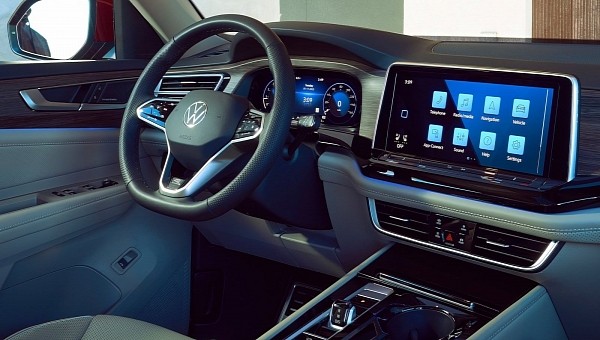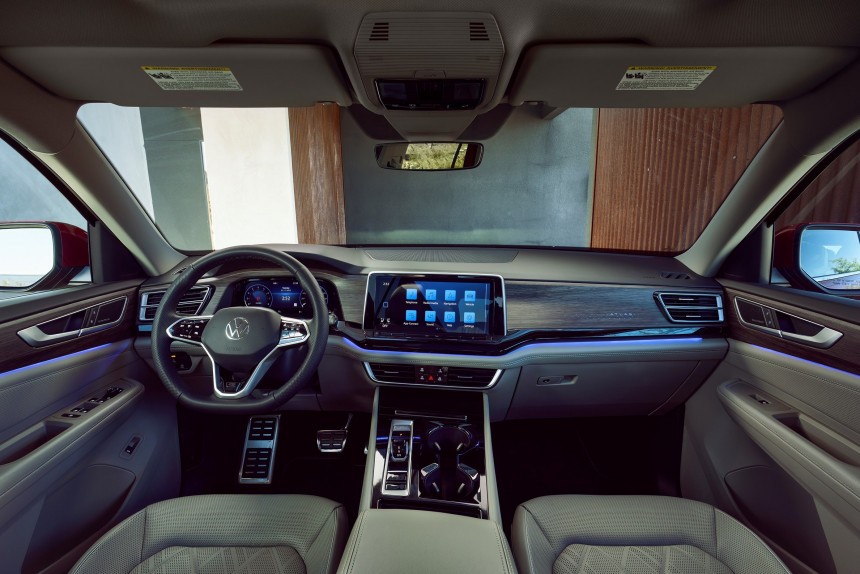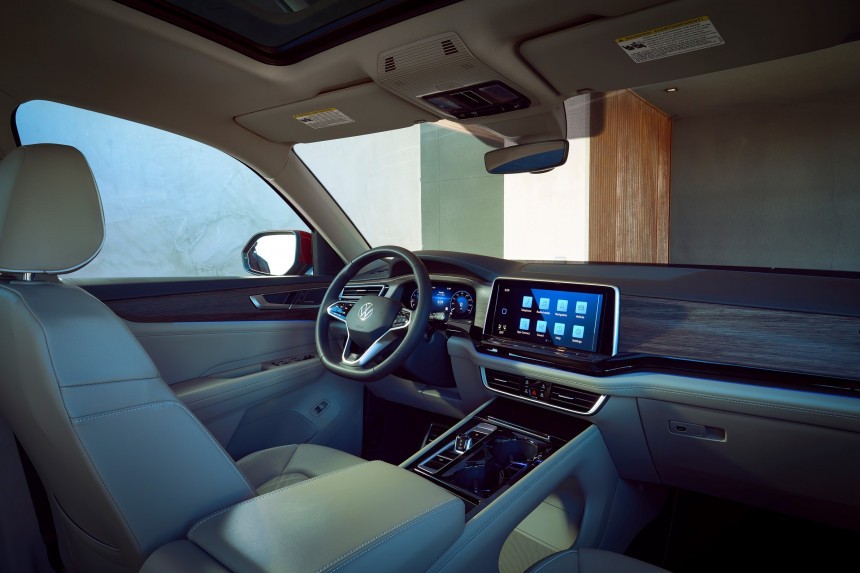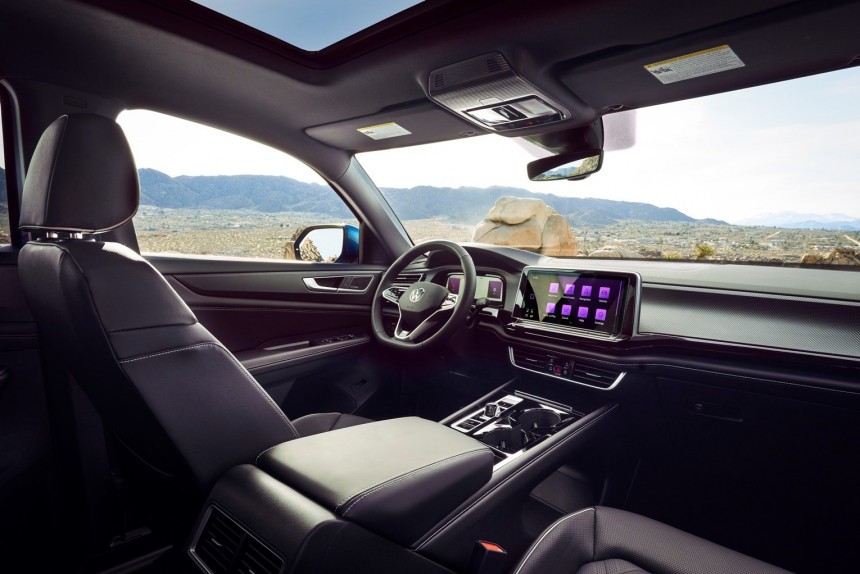Volkswagen plans to ship Android Automotive updates for up to 15 years, but the end of support could be pushed back for what it refers to as unicorn vehicles.
The adoption of Android Automotive is making progress, and more companies, including General Motors, Volvo, Polestar, and Volkswagen, are turning to Google’s platform to power the smart capabilities in their vehicles.
Unlike Android Auto, Android Automotive is a fully featured operating system. It runs at the hardware level and comes pre-loaded from the factory on the infotainment unit. It does not require a mobile phone to mirror the interface on the screen and features deeper integration into the vehicle.
Google’s automotive services can therefore provide more advanced functionality. Google Assistant, for instance, has access to air conditioning settings, while Google Maps can read battery information to automatically add charging stops along the route.
Like every operating system, Android Automotive receives regular updates. These include new features, but also security patches, as Google must fix vulnerabilities to block any potential exploits. Assessing the risk of a successful exploit is a difficult job, as Android Automotive does not have access to critical and safety vehicle features.
But a successful attack could provide a malicious actor with control over certain functions, such as the air conditioning systems. If the vehicle is connected to the Internet, the exploit could also be launched remotely. As such, an attacker wouldn’t need physical access to the vehicle.
Security updates are therefore critical for Android Automotive cars.
Every operating system comes with a support cycle, which is essentially a timeframe during which the parent company releases updates. In Android’s case, security updates are provided for an average of five years, and in some cases, the support can be extended to seven years.
Carmakers have rarely discussed their update policies for Android Automotive. The operating system is still in its early adoption phases, so most car manufacturers probably haven’t even defined their update targets in the long term.
Volkswagen says its goal is to offer updates for Android Automotive for the entire lifetime of vehicles. That’s certainly a bold promise, especially because some of Volkswagen’s models are known to work properly for decades.
The German carmaker says the lifetime of a vehicle is defined as a maximum of 15 years after service. In other words, Volkswagen considers the lifetime of a vehicle as a maximum period of a decade and a half, after which you should theoretically replace it with a new one.
The company says that some models in the Volkswagen Group, such as Bugatti, Porsche, and Lamborghini vehicles, could receive support for several extra years. This is because, as Dirk Hilgenberg, CEO of CARIAD, Volkswagen Group's software division, explains, these are premium vehicles that cost more, so proper support is required.
Volkswagen says it’ll focus particularly on safety and security because these are the most important parts of an operating system. As such, you shouldn’t expect new capabilities 10 years after you bought the car, so most updates would be aimed at addressing security vulnerabilities.
The 15-year lifetime, however, gives Volkswagen more control over how its vehicles are serviced. Parts are provided by suppliers, and these suppliers must update their production lines to cater to a wide range of cars. Eventually, older models are dropped to make room for newer versions – this is typically dictated by demand, but in some cases, carmakers themselves require suppliers to upgrade production lines, especially when new-generation vehicles are launched.
In addition to confusing regulations, dropping support for older vehicles is also enforced by the technology that’s being used by suppliers. Semiconductors, for example, are evolving at a fast pace, and producing today’s designs in 2043 is going to be very expensive. Chip architecture is evolving fast, and so do the materials that are being used. This is why component inventory is also being produced, but eventually giving up on older designs is something that must happen.
Volkswagen supporting Android-powered vehicles for 15 years doesn’t mean these cars would stop working when no further updates are released. Like in the case of a Windows computer, once the end of support is reached, these vehicles will continue to work properly. The only difference is that no new patches would be provided, so bugs and vulnerabilities in the software would be left unfixed.
Eventually, this could become a security concern for the entire industry. A similar trend is happening in the software world, where companies like Microsoft have a hard time convincing users to upgrade to newer versions. Windows 7, an operating system launched in 2009 and retired in 2020, is still a popular choice today. The reason is that moving to Windows 11, Microsoft’s latest operating system, requires hardware upgrades, and hardware upgrades are expensive.
A similar problem could arise in the automotive industry as well, as getting software support would come down to buying a new car. Compared to computers, however, cars are a lot more expensive, and customers are likely to resist the trend for much longer.
Unlike Android Auto, Android Automotive is a fully featured operating system. It runs at the hardware level and comes pre-loaded from the factory on the infotainment unit. It does not require a mobile phone to mirror the interface on the screen and features deeper integration into the vehicle.
Google’s automotive services can therefore provide more advanced functionality. Google Assistant, for instance, has access to air conditioning settings, while Google Maps can read battery information to automatically add charging stops along the route.
Like every operating system, Android Automotive receives regular updates. These include new features, but also security patches, as Google must fix vulnerabilities to block any potential exploits. Assessing the risk of a successful exploit is a difficult job, as Android Automotive does not have access to critical and safety vehicle features.
But a successful attack could provide a malicious actor with control over certain functions, such as the air conditioning systems. If the vehicle is connected to the Internet, the exploit could also be launched remotely. As such, an attacker wouldn’t need physical access to the vehicle.
Security updates are therefore critical for Android Automotive cars.
Carmakers have rarely discussed their update policies for Android Automotive. The operating system is still in its early adoption phases, so most car manufacturers probably haven’t even defined their update targets in the long term.
Volkswagen says its goal is to offer updates for Android Automotive for the entire lifetime of vehicles. That’s certainly a bold promise, especially because some of Volkswagen’s models are known to work properly for decades.
The German carmaker says the lifetime of a vehicle is defined as a maximum of 15 years after service. In other words, Volkswagen considers the lifetime of a vehicle as a maximum period of a decade and a half, after which you should theoretically replace it with a new one.
Volkswagen says it’ll focus particularly on safety and security because these are the most important parts of an operating system. As such, you shouldn’t expect new capabilities 10 years after you bought the car, so most updates would be aimed at addressing security vulnerabilities.
The lifetime of a vehicle
Volkswagen defining the lifetime of a vehicle as a maximum of 15 years is likely to spark controversy. A car should be able to work for much longer, especially if proper maintenance is ensured.The 15-year lifetime, however, gives Volkswagen more control over how its vehicles are serviced. Parts are provided by suppliers, and these suppliers must update their production lines to cater to a wide range of cars. Eventually, older models are dropped to make room for newer versions – this is typically dictated by demand, but in some cases, carmakers themselves require suppliers to upgrade production lines, especially when new-generation vehicles are launched.
In addition to confusing regulations, dropping support for older vehicles is also enforced by the technology that’s being used by suppliers. Semiconductors, for example, are evolving at a fast pace, and producing today’s designs in 2043 is going to be very expensive. Chip architecture is evolving fast, and so do the materials that are being used. This is why component inventory is also being produced, but eventually giving up on older designs is something that must happen.
Eventually, this could become a security concern for the entire industry. A similar trend is happening in the software world, where companies like Microsoft have a hard time convincing users to upgrade to newer versions. Windows 7, an operating system launched in 2009 and retired in 2020, is still a popular choice today. The reason is that moving to Windows 11, Microsoft’s latest operating system, requires hardware upgrades, and hardware upgrades are expensive.
A similar problem could arise in the automotive industry as well, as getting software support would come down to buying a new car. Compared to computers, however, cars are a lot more expensive, and customers are likely to resist the trend for much longer.




















































